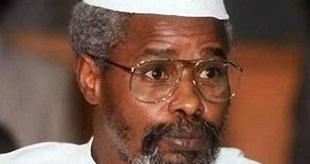
Dakar, Senegal | AFP |
A special court in Senegal sentenced former Chadian dictator Hissene Habre to life in jail Monday for war crimes and crimes against humanity, an unprecedented conviction seen as a warning to repressive rulers worldwide.
The verdict brings long-awaited closure for relatives of the up to 40,000 people killed and many more kidnapped, raped or tortured during his 1982-1990 term as president of Chad.
Habre was guilty of war crimes, crimes against humanity, rape, forced sexual slavery and kidnapping, said the president of the court Gberdao Gustave Kam, sentencing him to life in jail.
The 73-year-old, nicknamed “Desert Fighter”, had presided over “a system where impunity and terror were the law,” Kam said, face-to-face with the ex-leader who wore his trademark billowing white robes and sunglasses.
The case was heard by a special tribunal set up by the African Union under a deal with Senegal, and is the first time a country has prosecuted a former leader of another nation for rights abuses.
Habre raised his arms into the air on hearing the decision and shouted “Down with Francafrique!”, referring to the term used for France’s continuing influence on its former colonies.
He had declined to address the court throughout the 10-month trial, and refused to recognise its authority.
US Secretary of State John Kerry said the conviction was “an opportunity for the United States to reflect on, and learn from,” its involvement in Chad, referring to US and France’s backing of his regime as a buffer against Libya’s Moamer Khadafi.
The former leader has two weeks to appeal the sentence.
1 survivor of Habré’s abuses on today’s landmark verdict: “To all the dictators violating human rights in the world, this can happen”
— Samantha Power (@AmbassadorPower) May 30, 2016
Crowning achievement
Victims groups who had travelled to Dakar to hear the verdict were visibly moved by a judgement that comes a quarter of a century after the abuses they suffered.
“The feeling is one of complete satisfaction,” said Clement Abaifouta, president of the Habre survivors association known by the acronym AVCRHH.
“It’s the crowning achievement of a long and hard fight against impunity. Today Africa has won. We say thank you to Senegal and to Africa for judging Africa,” he added.
In the Chadian capital N’Djamena up to 250 victims and their supporters gathered to watch the trial on television at their group’s headquarters.
Women screamed with joy as the verdict was read out, embracing one another and shouting “We won!”, before taking to the streets and blocking traffic as they spread the news.
“This is a victory for the Chadian people against impunity and injustice, never again,” said Jean Noyama, a local leader of the AVCRHH.
‘A powerful message’
The precedent set by the verdict could be seismic, according to legal experts, especially after years of criticism that the International Criminal Court (ICC), based in The Hague, has tried African leaders many say should be judged on the continent.
UN High Commissioner for Human Rights Zeid Ra’ad Al Hussein said the verdict showed “nobody is above the law” at a time when the world is “scarred by a constant stream of atrocities.”
Reed Brody, a lawyer for Human Rights Watch who has spent the last 15 years working with victims to bring Habre to justice, said the conviction was a warning.
“This verdict sends a powerful message that the days when tyrants could brutalise their people, pillage their treasury and escape abroad to a life of luxury are coming to an end,” Reed said in a statement.
“Today will be carved into history as the day that a band of unrelenting survivors brought their dictator to justice.”
Habre’s conviction for personally raping a woman was also a first by an international court trying a former world leader, according to Human Rights Watch.
Lawyers for the victims said Friday their next step would be to obtain compensation for their clients in a civil suit.
Breaking: #HisseneHabre guilty of crimes ag humanity, torture, war crimes, rape. Sentenced to life imprisonment pic.twitter.com/U53N6mkUGC
— Reed Brody (@ReedBrody) May 30, 2016
Prison horrors
Known as a skilled desert warrior often dressed in combat fatigues to fit the role, Habre fled to Senegal after his 1990 ouster by Chad’s current President Idriss Deby.
Witnesses recounted the horror of life in Chad’s prisons, describing in graphic detail abusive and often deadly punishments inflicted by Habre’s feared secret police, the Documentation and Security Directorate (DDS).
Victims were subject to electric shocks and waterboarding while some had gas sprayed in their eyes or spice rubbed into their genitals, the court heard.
Habre’s defence team unsuccessfully sought to cast doubt on the prosecution’s argument that their client was an all-knowing, all-powerful head of the DDS, suggesting he may have been unaware of abuses on the ground.
For more than 20 years, the former dictator lived freely in an upmarket Dakar suburb with his wife and children.
“What we have seen today is not justice. It is a crime against Africa,” said Mahamat Togoi, part of a Habre supporters group. “It’s the dirty work of mercenaries in the pay of Francafrique.”
*****
“Hissène Habré, Ex-President of Chad, Is Convicted of War Crimes” pic.twitter.com/5spY2p7Q6k
— Vexy Vox (@Vexyvox) May 31, 2016
Former Chadian dictator Hissene Habre has joined a short list of sub-Saharan African leaders sentenced for serious crimes committed while they held office.
Who are the others and where are they from?
Convicted
LIBERIA – CHARLES TAYLOR
Taylor was sentenced in 2012 to 50 years in prison for crimes against humanity and war crimes in Sierra Leone, where he armed rebels in return for “blood diamonds”. Taylor was the first former head of state convicted by a world court since the post-World War II Nuremberg trials. His conviction was upheld in September 2013 and he remains imprisoned in Britain.
MALI – MOUSSA TRAORE
Overthrown in 1991 after 23 years in power, he was sentenced to death twice for “political crimes” in 1993 and, along with his wife, for economic crimes in 1999. The sentences were commuted to life in jail. Traore was pardoned in 2002.
CENTRAL AFRICAN REPUBLIC – JEAN BEDEL BOKASSA
The former emperor Bokassa (1965-1979) was sentenced to death in 1987 for ordering a massacre of children. His sentence was commuted to hard labour for life and then changed to solitary confinement. He was freed in 1993, three years before his death.
Convicted in absentia
MADAGASCAR – MARC RAVALOMANANA
Ravalomanana, who had taken refuge in South Africa, was sentenced in absentia in August 2010 to life in prison and hard labour for the deaths of 30 protesters killed by his presidential guard in February 2009. He was arrested in October 2014 after he returned to Madagascar, but his sentence was then lifted and he was freed from house arrest in May 2015.
ETHIOPIA – MENGISTU HAILE MARIAM
Found guilty of genocide during the country’s “Red Terror” in 1977-1978, he was in 2007 sentenced to life in prison in absentia, then condemned to death on appeal in May 2008. He has been living in exile in Zimbabwe since his regime was overthrown in 1991.
 The Independent Uganda: You get the Truth we Pay the Price
The Independent Uganda: You get the Truth we Pay the Price


